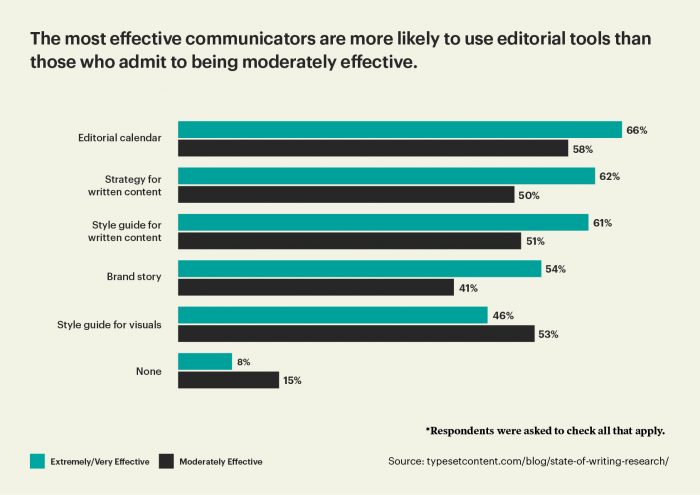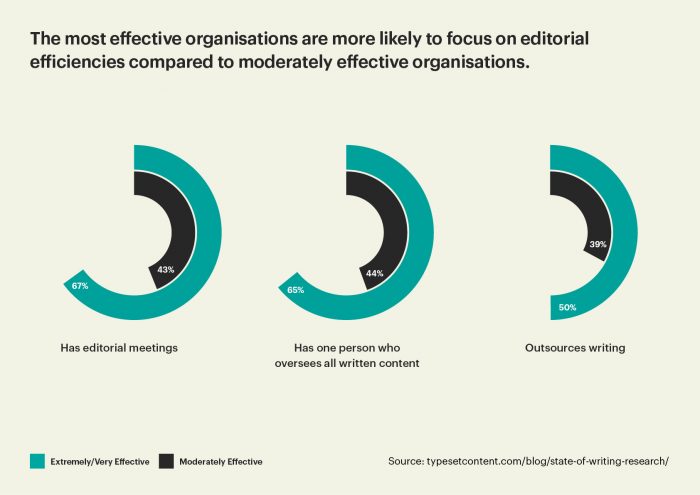
Do you know the difference between good writing and effective writing?
It’s easy enough to recognise awful writing. But good writing is subjective; what I like might not appeal to you. When it comes to writing for business, the most successful writing isn’t necessarily the most sophisticated prose. And that’s where confusion sets in.
Let’s face it; writing is not something everyone enjoys doing. And it can be time-consuming, which instantly makes it an expensive undertaking. If we can identify what the most effective business communicators do compared to their counterparts who aren’t enjoying as much success, we know we’re on the path to figuring out how we can all be more successful at our writing tasks.
In State of Writing 2020 research, we wanted to find out what business communicators should be doing to make their writing as effective as possible. We wanted to get to the bottom of what practices, techniques and habits provided a better return on investment for the writing process.
The results showed business communicators have a lot of work to do. Survey respondents were confident they can identify what’s good and what isn’t – 76 per cent said they know successful writing when they see it. Only 45 per cent of the respondents considered their writing effective. So how do you close that gap?
2021 global survey into writing effectiveness is now open: If you’d like to contribute to our State of Writing research for next year, please take the State of Writing 2021 survey. All participants will receive an early copy of the report (before publication).

I wanted to find out what some of the best writers I know think about writing effectiveness.

Belinda Weaver.
I checked in with the super talented Belinda Weaver, copywriting coach and owner of Copywrite Matters, to get her opinion of what successful writing looks like. She teaches copywriters how to be more successful, so I was interested to know how she assesses what works and what doesn’t when it comes to writing.
“For me, successful writing engages and inspires readers to overcome inertia and take action,” Belinda said.
“That action might be a click, a share or a sale, but it could also be an emotional reaction, a shift in thinking or the inspiration to make a change.
This makes a lot of sense; the reason we write for business purposes is to convince people to support us in some way. That’s true for both internal and external audiences. Belinda went on to describe what it takes to motivate our readers.
“That kind of reaction comes from a strong writing process that includes planning, writing and editing.
“In my early years as a writer, I focused on my writing. The more experience I gain, the more time I invest in the planning and editing stages.
“Well-planned writing is faster to write and easier to edit!”
The results of our research support Belinda’s view on planning. Moderately effective writers were less likely to use editorial tools that take advance planning. These include:
The research also showed less-successful writers tend to be more focused on visual content. Moderately effective writers were more likely to have a style guide for visuals than their more successful counterparts. And, 15 per cent of moderately effective writers admitted to using no editorial tools at all.

Belinda also makes an interesting point about how good planning makes writing faster and easier to edit. Editorial rigour stood out in our research as a key contributor to writing effectiveness.

Jonathan Crossfield.
I asked Jonathan Crossfield, a content writer and editor, about the importance of editing in the pursuit of writing success. He’s also one of the best storytellers working in content marketing – read any of Jonathan’s articles at the Content Marketing Institute for proof. Jonathan provided a fabulous analogy for anyone who doesn’t quite see the value of the editing process for business writing.
“Being able to recognise good or bad writing isn’t the same as knowing what to fix when it clunks. When driving, most of us can feel if the car is running effectively without training to become a mechanic.
“But should the engine start making strange noises, most of us wouldn’t know how or what to fix. Meanwhile, a mechanic will take one listen, say, ‘Your deviated flange is loose,’ and get a spanner. (Note: I’m not a mechanic.)
“As any good mechanic or editor will tell you, performing routine maintenance and checks – whether checking the oil or checking the style guide – will reduce the risk of expensive repairs later.”
Our research backs up Jonathan’s story. Those businesses experiencing only moderate success with their writing are lagging behind when it comes to editorial efficiencies, sometimes by a large margin. The most effective organisations, by contrast, focus on things that aid the writing process:

Clearly, there’s no simple solution to successful writing. It’s partly a creative pursuit and, in a business context, partly focused on achieving some sort of goal. While it might seem like putting words on a page is the start and end of writing, professional opinion and our research point to the importance of editing as a contributor to overall effectiveness.
Another reason to adopt an editorial focus in your writing is because it saves time and money. From personal experience, using a proofreader is one of the best productivity hacks I know. If I’m not labouring over whether something is grammatically correct, I can write faster and submit a piece earlier.
After years of working with a proofreader, I easily save about 10 per cent of the time I spend writing by relying on someone else to find the niggling errors in my copy. Using that formula alone justifies the expense of a proofreader which, in my opinion, is also an investment in quality. Try calculating it for yourself and you might be surprised at how much money you’re spending on writing.

While a proofreader is a final quality check, an editor is essential to writing success.
A good editor ensures effectiveness because they are representing the audience. Even the best writers rely on their editor to help them get to the heart of what they’re trying to achieve. For business communicators this is even more vital because no-one reads this kind of writing for leisure. If you’ve ever been stuck and aren’t sure why something you’ve written isn’t working, an editor can sort it out for you.
READ MORE: Do I need an editor or a proofreader?
There’s plenty of debate about good writing and quality writing. A whole industry of critics and book reviewers can weigh in on that. If you’re writing as part of your work or on behalf of your business, the focus should be on what makes your writing effective.
The State of Writing 2020 research takes a deep dive into what the most successful communicators do in an effort to help us all become more efficient and more successful and to achieve a better return on our writing investment. As Belinda Weaver reminds us, successful writing motivates the reader to take action, the ultimate goal of any business.
You can get the full State of Writing 2020 research report on writing effectiveness, complete with tools and tips to put you on the path to writing success. We’d love it if you participated in next year’s survey, which will be out late this year. We’ll be announcing when the survey opens in The Write Fit newsletter so be sure to subscribe.
